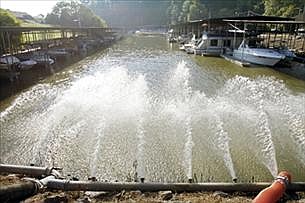PDF: Notice of violation
Tennessee pollution regulators have slapped Chattanooga with a notice of violation for the 12- to 14-hour sewage spill at Browns Ferry on Aug. 5.
The state's Department of Environment and Conservation also is requiring the city to aerate and monitor the water in the narrow inlet of the Browns Ferry Marina until the water quality levels there "meet and sustain" state standards even when the mechanical water stirrer now in place is turned off.
"The standard is 5 milligrams [of oxygen] per liter, and in anything below that game fish are not happy," said Dick Urban, head of TDEC's water pollution office in Chattanooga.
"When this started there wasn't even two-tenths of 1 milligram of oxygen left in the water," Urban said.
City officials said the spill occurred after a lightning strike caused a power outage and about 100,000 gallons of untreated sewage spilled into a bottle-necked marina bay on the Tennessee River. Within hours, about 3,600 fish died, according to environmental reports.
SPILLS INCREASESewage spills to the Tennessee River from Moccasin Bend Sewage Treatment Plant or combined sewer and stormwater overflows:* 2006: 8,720 gallons* 2007: 14.5 million gallons* 2008: 35.5 million gallons* 2009: 122.3 million gallons* 2010: 146.5 million gallonsSource: Tennessee Clean Water Network, Tennessee Department of Environment and Conservation
TDEC records show that it wasn't until Aug. 12 that one of four separate monitoring sites in the marina bay returned to a safe oxygen level - 5.0.
Two days later, two sites were back to normal, but the remaining two monitoring sites were still measuring below standard even on Aug. 19, the most current testing records available, Urban said.
E-coli levels remain far above standards, records show.
Fixes slowly working
To combat the problem, Urban said the city is running aerators, something akin to sprinklers, at several locations in the inlet.
Additionally, inlet water is drawn into sewer lines to be piped back to the sewage plant for treatment. Fresh water is being piped in to replace what is drawn out.
"They will have to keep that up until the water consistently meets standards," Urban said.
Jerry Stewart, Chattanooga's director of waste resources, could not be reached for comment. Public Works administrator Steve Leach deferred comment to city spokesman Richard Beeland.
"We self-reported the spill, worked with TDEC to determine remedial actions, and have taken such actions," Beeland said. "The NOV [notice of violation from TDEC] is not unexpected. It is a matter of standard protocol and procedure."
Beeland said city officials have not heard from the U.S. Environmental Protection Agency or the Department of Justice, both reportedly also looking at sanctions against the city for repeated sewage and stormwater overflow problems.
TDEC's notice of violation carries no penalty. Normally, multiple violations will result in a regulatory order that does carry a penalty.
Last year state regulators did issue an order against the city because of multiple and increasing notices of violation. But the state withdrew the order when EPA asked Volunteer State regulators to hold off while federal officials prepared a case of its own against the city. No federal action has been taken yet.
Looking for answers
This week, Urban said the city told state regulators that sewage treatment plant workers didn't know the manhole that overflowed at Browns Ferry Marina existed.
Urban said the city also had overflows downtown on the same day of the Browns Ferry spill.
"We informed EPA of this. They said the west bank [downtown] overflow would be incorporated into the overall order that will be developed," Urban said.
EPA spokeswoman Dawn Harris Young said she could not comment on the timing of any prospective EPA action, but she said it is not unusual for EPA to work with the U.S. Justice Department on enforcement actions.
She said that had happened already in several other cities, including Nashville.
Two years ago in Nashville, the Justice Department announced a settlement expected to cost the metro area $300 million to $400 million.
Officials at Browns Ferry Marina did not return calls Thursday.
Continue reading by following these links to related stories:
Article: Sewage spills leading to court
Article: Sewage overflow swamps marina, kills 3,600 fish
Article: Moccasin Bend wastewater problem could take hours or days
